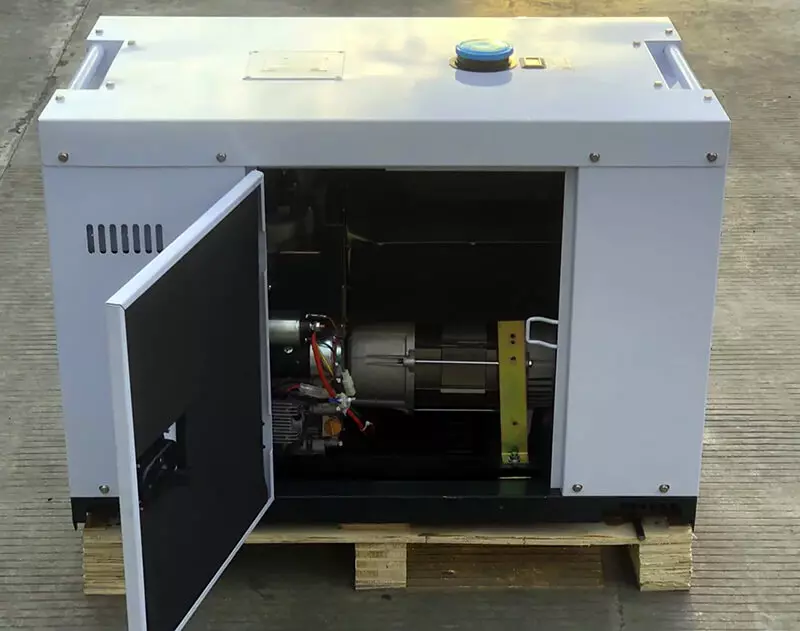17Apr 2024
table of contents

Slowly rising smoke from a diesel generator exhaust is an engine symptom that indicates potential operating problems and is an important warning sign. lgnoring these signs may result in shortened engine life, may increase operating costs, and may require immediate remedial action.
Diesel generators produce three colors of smoke, black, white and blue, each echoing different conditions about the engine. However, in this article, we focus primarily on black smoke.
So, why do diesel generators emit black smoke? The answer is not simple and involves numerous contributing factors, including incorrect ignition timing, open injectors, excess fuel, and even a faulty turbocharger. We'll delve deeper into these factors to fully understand this disturbing phenomenon.
By reading this article, you will have an in-depth understanding of the mystery of "black smoke"from diesel generators. You'll learn why this happens and how each problem causes black smoke. And how to solve it, please read on and let this knowledge improve the service life and efficiency of your diesel generator.
Black smoke from a diesel generator is a clear sign of inefficiency. lt indicates an incorrect fuel to air ratio, usually caused by excess fuel. The reason is that some irregular operations can lead to unique black smoke emissions. Let's thoroughly examine each factor.
Improper timing: When fuel injection route map isn't correctly synchronized with piston's movement, it may lead to incomplete combustion, causing emission of black smoke. Incorrect timing can disturb proper blending of fuel and air, thus diminishing combustion efficiency.
Sticking injectors: Fuel injector problems involve frequent sticking of the injectors. This failure often results in excess fuel supply, which affects engine performance and triggers the release of black smoke.
Over-fuelling: Too much fuel into combustion chamber may exceed ability of air to promote complete combustion, resulting in black smoke from unburned fuel.
Turbocharger failure: Malfunctioning turbocharger could disrupt air delivery leading to incomplete combustion, appear to black smoke.
Inaccurate valve clearance: lnaccurate clearances of intake and exhaust valves can impede air supply, impede efficient emission of combustion gases, resulting in black smoke.
Incorrect air fuel ratio: Diesel engines operate optimally at a precise air-fuel ratio. Especially one with less air, can lead to the appearance of unburned fuel, show up black smoke.
Insufficient cylinder compression: Complications stemming from piston rings sticking or worn-down components can compromise cylinder compression, facilitating inadequate combustion that winds up emitting black smoke.
Unclean air filter: An air filter fraught with dirt and debris can obstruct the air's entry into the combustion chamber, impeding complete combustion, and thus, resulting in the production of black smoke.
Limited sensing system: A system that is too small or a kink in the intake tube can limit sensing in the swing area, reducing air supply and causing black smoke.
Dirty intake manifold: A contaminated intake manifold will restrict the entry of air, prevent the complete combustion of fuel and produce black smoke.
Poor-quality fuel: Poor-quality fuel may contain contaminants, fail to burn completely and cause black smoke to be emitted.
Accumulation of excessive carbon in combustion and exhaust regions: When an excess of carbon precipitates within the combustion chamber or the exhaust areas, it can stifle the smooth transit of gases, leading to subpar combustion. This in turn results into the emissions of black smoke.
Low operating temperatures: When engine runs at temperatures lower than optimal, the combustion process may not function efficiently, leading to the emission of black smoke.

There are many reasons why diesel generators emit black smoke, ranging from incorrect timing to too low operating temperature, which will bring significant consequences. Let us understand effects caused by black smoke from diesel generators:
Environmental contamination: The combination of gases and particulate matter present in black smoke are easy to lead smog, deteriorating air quality, potentially worsening respiratory diseases, and contributing to the climate crisis.
Hindered generator performance and efficiency: The emergence of black smoke signifies an incomplete combustion process or over-fueling. Both scenarios can negatively impact the performance and efficiency of generator, leading to heightened fuel usage.
Elevated upkeep costs: The circumstances leading to black smoke typically necessitate increased frequency of repairs or parts replacement, amplifying the overall expenses associated with maintaining a generator. Neglecting these warning signs over an extended period can inflict permanent damage to your generator, which could culminate in steep repair or replacement costs.
While the black smoke emitted by diesel generators comes with its own set of effects, some remedies can alleviate these challenges. The following are proactive measures to tackle black smoke from diesel generators:
Routine upkeep: Consistent maintenance is fundamental for the efficient functioning of diesel generators. This comprises regular cleaning of air filters to avoid blockages, thereby ensuring an adequate air-fuel mix. It also means continuous inspection and maintenance of the fuel system to prevent excess fuel or injector problems.
Employ superior-grade fuel: The quality of fuel, although frequently ignored, has a significant impact on your generator's output. Utilizing premium fuel enhances combustion efficiency and diminishes carbon accumulation, which minimizes the emission of black smoke.
Engage professional assistance: If basic preventative actions fail to rectify the issue, seeking guidance from an expert is paramount. Technicians can quickly diagnose complex problems such as turbocharger failure, incorrect valve clearance or worn cylinder components and initiate effective repairs.
Optimum timing settings: Ensures fuel injection timing is properly aligned with piston movement for complete combustion. Adjust injection timing according to the manufacturer's instructions or call a professional.
Maintain a balanced air-fuel ratio: The air and fuel mixture needs to be optimal for efficient combustion. Monitor this ratio regularly and make necessary adjustments to prevent black smoke from forming.
Clean the intake manifold and intake system regularly: Regular maintenance of the intake manifold and intake system, to avoid restricting airflow that can lead to inefficient combustion.
Optimum operating temperature: Put your diesel generator is functioning within optimal temperature range as outlined by the manufacturer. Operating temperature that is too low will result in incomplete combustion, resulting in black smoke.
By following the steps above, you can keep your diesel generator running smoothly and unencumbered by black smoke, promote efficient, reliable power generation, and maintain good air quality for both the machine and the surrounding environment.
inquiry form here
BISON BLOG, All the latest news and views from Bison Machinery.